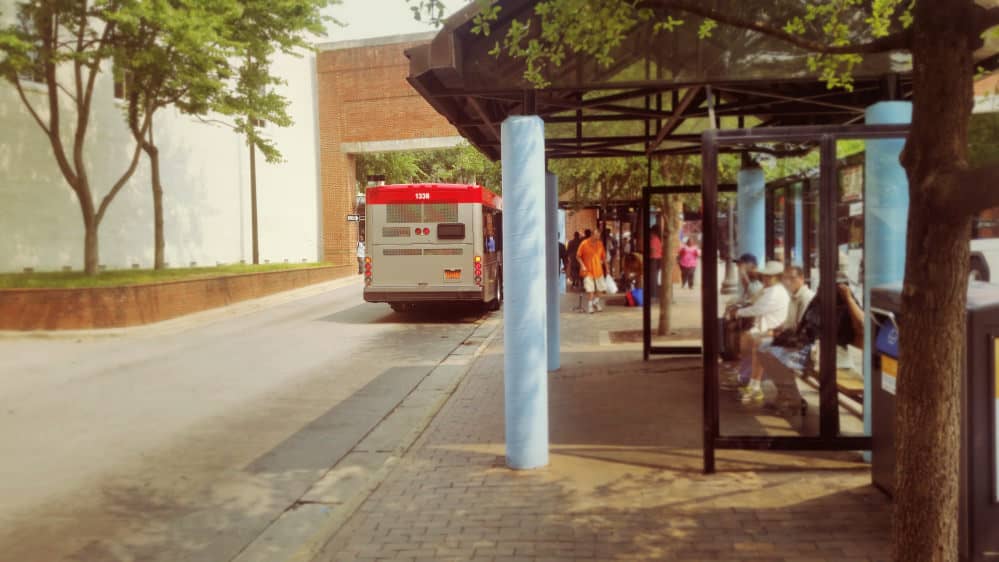As a college student I always enjoyed dining in downtown, strolling through city parks, and smelling the stench of sun beating on worn and stained concrete. In the urban jungle I felt much more alive than I ever did on the dogwood-lined sidewalks of the suburb in Eastern North Carolina I hesitantly thought of as home.
I would stare in amazement at the bus station. Neon lights beckoned the locations and times to travelers. The buses were graffitied. I was attracted to the lack of romance. That station was the dose of reality my veins craved.
After completing my four-year stint at North Carolina State University, I became a teacher in one of the state’s arguably most challenging, yet vibrant and intriguing schools. The station was no longer a world I visited from time-to-time when I enjoyed a dinner or brunch with my family downtown. It was a dose of my student’s reality.
Standing in bus lines.
Nowhere to go.
Wondering what they had done wrong or who had done wrong by them.
Early on in my first year of teaching I walked by the station. I was crippled by the thought of my students, my kids, who I had grown such a strong affection for, standing in the bus lines lost.
I set my mind to keeping my kids out of the bus lines and in the storylines of great novelists and poets.
Four years of schooling, eight years of schooling, infinite years of schooling do not prepare you for what you experience in your first days as a teacher.
Stepping into a 9th grade English classroom, I knew my students would be behind my Advanced Placement kids. I knew skills would be lacking, but I was not ready for many of my students at 14 to 17 years old to not know how to read.
They could maybe recite painstakingly a couple paragraphs at a time, but there was no comprehension behind their mispronounced words. There was no questioning of text. How could they get lost in the storylines of our great writers, if they couldn’t interpret the words on the page?
Early on, a student said out loud in class,
“Mr. B, I just read dis page but nothin stickin!”
The reality struggling readers face everyday.
After nights of lying in bed sleepless, tossing and turning, frustrated and overwhelmed by the mountain ahead I had to climb, I broke into to tears in front of my assistant principal. She closed the door behind me and asked,
“What can I do for you?”
“What do you want me to do? What do you expect? I have 11 kids who are non-native English speakers, I have 28 kids after lunch that can’t sit longer than 15 minutes, I have kids that are only two years out of the ESL program and can’t comprehend directions at the top of the page. And student services just added another kid to my class who needs accommodations, has a history of legal trouble, and just walked out.”
“Breathe. Let it out.”
“Let what out?”
“Your frustrations. I’m here for you. This job isn’t easy.”
We can’t change where our students have come from, we can’t undo what has been done to them, but you can provide a space for them in their day where they feel nurtured and cared for. That is the best we can do.
“I don’t know how to teach a kid how to read! I wasn’t trained in elementary education. How does this happen?”
“I honestly don’t know. What I do know is I have to tell myself on a regular basis I can’t be perfect in an environment that was not created perfect. Take the small successes and run with them. We can’t change where our students have come from, we can’t undo what has been done to them, but you can provide a space for them in their day where they feel nurtured and cared for. That is the best we can do.”
“How do I do that?”
She proceeded to then cap my class and set me up with our school’s reading interventionist. I felt defeated.
In college, studying to become a teacher, I had heard these stories but never understood the reality till I had reached my own breaking point.
The interventionist swept in. We created anchor charts, graphic organizers, and broke down the students thinking.
We came to their level.
We had to start somewhere and that somewhere was decided by the students.
Slowly we started to see success. It was immeasurable at first. It was the smile on the face of a kid who realized the meaning of a word on their own or the joy of reading a full chapter. It was in the general curious nature of their voices as they wanted to know more and began asking questions.
The success was measured by a student who could only focus for five minutes at a time and soon was able to make it through the 25 minutes of a chapter reading — mind you not the whole period, but that extra 20 minutes of focus was success.
He looked at me one day after completing an assignment and uttered, “Mr. B, you doing a good job with us kids.”
The most authentic praise I have ever received.
Unfortunately, his focus was not sustained, and he was gone weeks later.
I had another student who had moved through several different schools over her life, her parents did not speak English, and the student was a non-native English speaker. At 16 and a first-time freshman, she would be 20 years old at graduation. The climb to a diploma was already years behind.
Her general curiosity and the fact this student showed up to class everyday on time fueled our journey in the same way an energy bar does for the avid hiker. As our interventionist sat on the floor reading Poe’s 19th century, “Tell-Tale Heart,” with this student on Halloween, it became evident that no one had ever sat with this kid one-on-one to read.
They drew pumpkins around words the student didn’t know and worked through each, one-by-one, until the whole story was comprehended. The student was high-fiving us and walking out of the classroom with one more page, numerous high level new words under her belt, heading towards the end of the quarter with a C average. Even though the strategy was targeted for elementary rather than high school readers, the student learned. We learned. The student thought and questioned. The student grew. We grew.
My kids were in the lines of America’s great poets and writers.
By the end of the quarter, the kid not only began to read but to dream. Dreamed of becoming a nurse, then a surgeon. We met with the mother, set up a graduation plan, and held the student to high standards.
Not long after, she started hanging out with another crowd. The leader of the crowd was the first one to get kicked out of school. Soon they all started dropping like flies. My student’s attendance shrank, alongside her grades. By Christmas I received an email. She had been long-term suspended and would not be returning in the spring.
In early June, I was wrapping up my grades and my first year of teaching. I became overwhelmed by the decisions I was having to make.
Had a student done enough to deserve a D and be promoted?
If I failed them,then had I become a gatekeeper?
Should their future be set at 14?
I left work that afternoon, my mind collapsing from the stress. I waded through Moore Square and then through our downtown bus station on my way to a second job.
Lost and preoccupied with my own conceptions of failure and success, I heard a familiar voice.
“Mr. B!”
I turned around. There in the bus lines she stood.
Recommended reading




